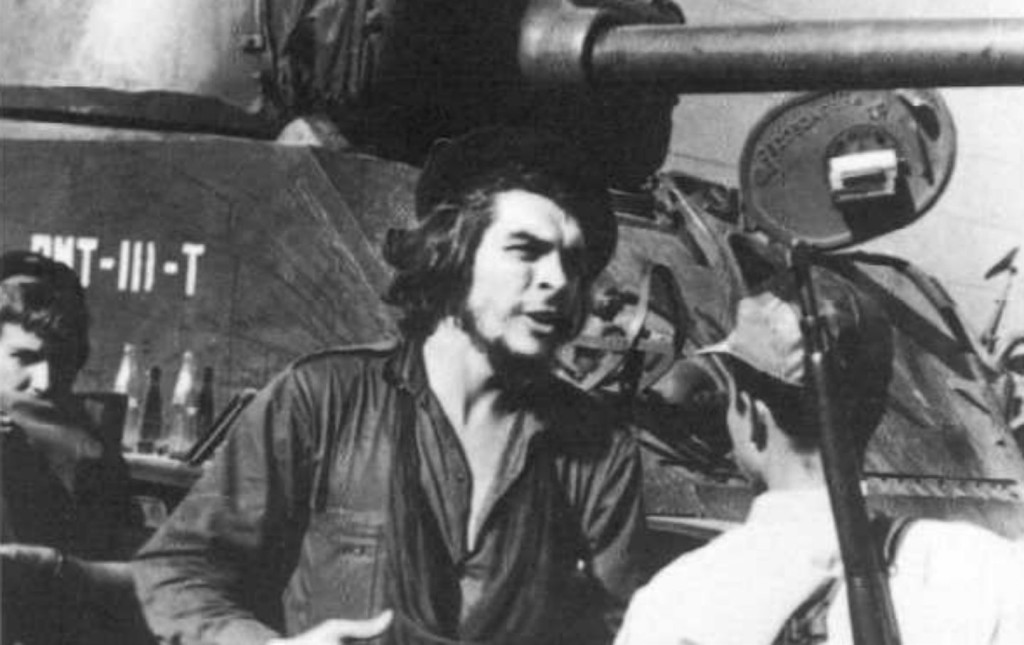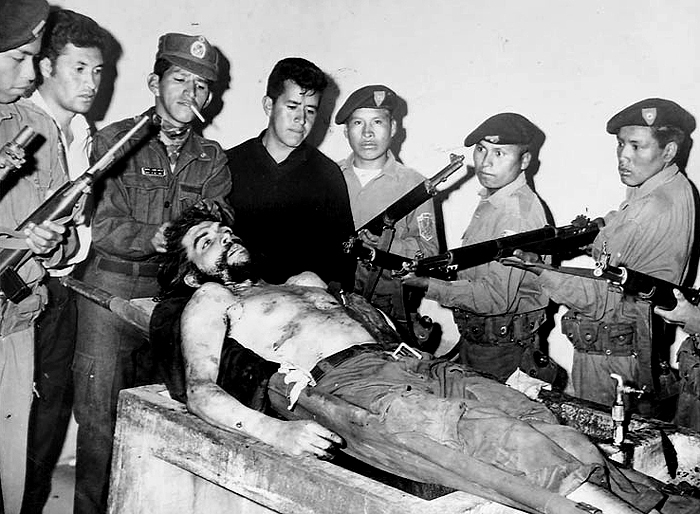October 9, 1967: Che Guevara Is Executed in Bolivia
HISTORY, 12 Oct 2015
“His is a revolutionary ideology in which death and tragedy occupy, close in the foreground, an unwanted, redemptive place.”

Che Guevara after the battle of Santa Clara during the Cuban revolution in 1958. (Wikimedia Commons / Oficina de Asuntos Históricos de Cuba)
Che Guevara was executed by the Bolivian army on this day in 1967. When his self-selected executioner hesitated before firing, Guevara allegedly spat at him and shouted: “Shoot me, you coward! You are only going to kill a man!” In The Nation one month, later, the novelist and journalist Jose Yglesias wrote about Guevara’s death. (The blogger Matt Yglesias, currently of Vox, is his grandson.)
Let us assume that Che Guevara is dead. Simply because of the photographs. A week of news reports made clear only that we are uneasily dependent on Bolivian army generals, backed up, in the matter of fingerprint identification, by Argentinian authorities…. As I write, the Bolivians, who first buried, then cremated Che, are saying that they cut off his hands and have kept them. Shocking but perfectly right—like a surprising turn in a Dostoevski novel—and a reminder of the kind of mentality that our special forces are training in the suppression of revolutionary guerillas. Someone should tell the Bolivian generals—someone steeped in their medieval tradition—that these hands, like Saint Teresa’s, may well be with us for a long time: to strengthen the nonreligious but barefoot Order—like Saint Teresa’s stoical Carmelites—of the guerillas of South America.…
It is a death that Che has often rehearsed, turned over in his mind, gone out to meet. After two years of silence, he sent a message to Cuba for publication last April in the first number of the magazine of the Tri-Continental Organization…. In it, he analyzed the world political situation and argued for the creation in the Third World of “two, three, many Vietnams.” The last paragraphs of the message turn, in a very personal way, to his own role, and end with a perfectly cadenced Spanish sentence: “Wherever death surprises us, welcome be it, so long as this, our battle cry, reaches a receptive ear and another hand stretches out to grasp our arms and other men lend their voices to funeral songs accompanied by the rattle of machine guns and new cries of war and victory”.…
It is a strange voice to hear so far from the world of which it speaks. A voice repellent to our comfort and our common sense—thank God, he looks for no recruits amongst us. His is a revolutionary ideology in which death and tragedy occupy, close in the foreground, an unwanted, redemptive place.
Read The Nation Full Document: OCTOBER 9, 1967
Go to Original – thenation.com
DISCLAIMER: The statements, views and opinions expressed in pieces republished here are solely those of the authors and do not necessarily represent those of TMS. In accordance with title 17 U.S.C. section 107, this material is distributed without profit to those who have expressed a prior interest in receiving the included information for research and educational purposes. TMS has no affiliation whatsoever with the originator of this article nor is TMS endorsed or sponsored by the originator. “GO TO ORIGINAL” links are provided as a convenience to our readers and allow for verification of authenticity. However, as originating pages are often updated by their originating host sites, the versions posted may not match the versions our readers view when clicking the “GO TO ORIGINAL” links. This site contains copyrighted material the use of which has not always been specifically authorized by the copyright owner. We are making such material available in our efforts to advance understanding of environmental, political, human rights, economic, democracy, scientific, and social justice issues, etc. We believe this constitutes a ‘fair use’ of any such copyrighted material as provided for in section 107 of the US Copyright Law. In accordance with Title 17 U.S.C. Section 107, the material on this site is distributed without profit to those who have expressed a prior interest in receiving the included information for research and educational purposes. For more information go to: http://www.law.cornell.edu/uscode/17/107.shtml. If you wish to use copyrighted material from this site for purposes of your own that go beyond ‘fair use’, you must obtain permission from the copyright owner.
